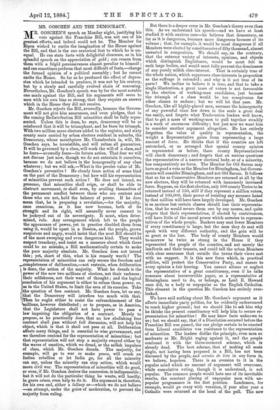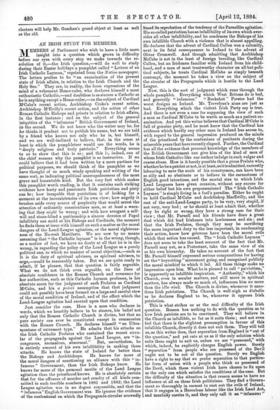MR. GOSCHEN AND THE DEMOCRACY.
MR. GOSCHEN'S speech on Monday night, justifying his vote against the Franchise Bill, was not one of his greatest efforts, and indeed could not be. The Member for Ripon wished to excite the imagination of the House against the Bill, and that is the one oratorical feat to which he is un- equal. He can state facts with delightful clearness, as in his splendid speech on the appreciation of gold ; can reason from them with a frigid persuasiveness almost peculiar to himself ; and can sometimes perform that most difficult of feats,—change the formed opinion of a political assembly ; but he cannot excite the House. So far as he produced the effect of depres- sion which he intended to produce, it was not by his oratory, but by a slowly and carefully evolved chain of reasoning. Nevertheless, Mr. Goschen's speech was by far the most notable one made against the Bill, and his arguments will seem to men with his own bias so strong, that they require an answer which in the House they did not receive.
Mr. Goschen rejects the Bill, avowedly, because the Govern- ment will not give him assurances, and even pledges, that in the coming Redistribution Bill minorities shall be fully repre- sented. Unless this is done, he says, democracy will be so reinforced that it will be triumphant, and he fears its triumph. With two million more electors added to the register, and sixty county seats carried by urban electors resident in suburbs, the Democracy, whose mouthpiece Mr. Chamberlain is, will, Mr. Goschen says, be irresistible, and will refuse all guarantees. It will be governed by a class, will work the will of a class, and he fears—avowedly fears—its future action. That fear we will not discuss just now, though we do not entertain it ourselves, because we do not believe in the homogeneity of any class whatever ; but we will ask,—What is the precise value of Mr. Goschen's preventive ? He clearly fears action of some kind on the part of the Democracy ; but how will his representation of minorities prevent such action ? He does not intend, we presume, that minorities shall reign, or shall be able to obstruct movement, or shall even, by availing themselves of the permanent conflict between_ those who are content and those who are not, hold the balance of power. If he does mean that, he is preparing a revolution,—for the majority, once conscious, as it has now become, both of its strength and its right, will assuredly never consent to be jockeyed out of its sovereignty. It must, when deter- mined, rule. Any arrangement which left to the people the appearance of power, yet in practice disabled them from using it, would be upset in a Session, and the people, grown suspicious and angry, would insist that the next Bill should be of the most sweeping and even dangerous kind. They would suspect treachery, and insist on a measure about which there could be no mistake, a Bill mathematically certain to make the pure majority absolute. Mr. Goschen does not intend this ; yet, short of this, what is his remedy worth ? The representation of minorities can only secure the freedom and ...completeness of deliberation,—not restrain, when deliberation is done, the action of the majority. What he dreads is the power of the new two millions of electors, not their rashness ; their selfishness, not their want of thought ; and the logical conclusion of his argument is either to refuse them power, or, as in the United States, to limit the area of its exercise. Take the question of free contract. Mr. Goschen fears, let us say, that the Democracy will interfere too much with that. Then he ought either to resist the enfranchisement of the 'millions, however distributed ; or to propose, as in America, that the Legislature shall not have power to pass a law impairing the obligation of a contract. Merely to propose, as he practically does, that no law abolishing free contract shall pass without full discussion, will not help his object, which is that it shall not pass at all. Deliberation affects many things, and is essential to wise government, and we therefore contend for the representation of minorities ; but that representation will not stop a majority swayed either by the waves of emotion which we dread, or the selfish impulses of class, which Mr: Goschen dreads. The majority, for example, will go to war or make peace, will crush an Indian rebellion or let India go, for all the minority can say, unless the minority can stop action, which would mean civil war. The representation of minorities will do good, or even, if Mr. Goschen desires the concession, is indispensable ; but it will not do the particular thing he wants, will hardly, in grave crises, even help to do it. His argument is, therefore, for his own end, either a fallacy or—which we do not believe —an attempt, under the guise of moderation, to prevent the majority from ruling. But there is a deeper error in Mr. Goschen's theory even than this. As we understand his speech—and we have at least studied it with anxious care—he believes that democracy, so far as it is dangerous, becomes more dangerous because of its volume ; that, for example, it would be most dangerous if all Members were elected by constituencies of fifty thousand, almost unvaried in composition. We should say, on the contrary, that the extreme variety of interests, opinions, and objects which distinguish Englishmen, would be most felt in such large bodies, and would most fully prevent the dominance of any purely selfish class-interest. That is certainly true of the whole nation, which suppresses class-interests in proportion as the suffrage is extended ; and why is it not true of its parts ? We incline to believe it is true, and that to take a single illustration, a great mass of voters is not favourable to the election of working-man candidates, just because the triumph of a class would be too conspicuous for other classes to endure ; but we will let that pass. Mr. Goschen, like all highly-placed men, assumes the homogeneity of any powerful class low down in the scale a great deal too easily, and forgets what Trade-union leaders well know, that to get a mass of working-men to pull together steadily is a work of enormous difficulty ; but just now we want him to consider another argument altogether. He has entirely forgotten the value of quality in representation, the weight a Representative gains from representing a large amount of force. He thinks that if the counties are left untouched, or so arranged that special county opinion is represented as before, these county Representatives will check democracy ; and forgets that on serious questions the representative of a narrow electoral body, or of a minority, has comparatively no force. The Member for Old Sarum may have as good a vote as the Member for Birmingham, but Govern- ments will consider Birmingham, and not Old Sarum. It follows that so far as Conservative Members are returned at all by the new electors, they will be returned with immensely increased force. Suppose, on the first election, only 100 county Tories to be returned instead of 150, still if they represent a million voters, instead of 100,000, their power of resisting any measure hated by that million will have been largely developed. Mr. Goschen is so anxious lest certain classes should lose their representa- tion, that he would secure them one by any means, and quite forgets that their representatives, if elected by contrivances, will have little of the moral power which accretes to represen- tatives of the whole people. Bankers may seat fewer Members if every constituency is large, but the men they do seat will speak with very different authority, and the gain will be as great as the loss. The body of county Members would to-morrow be twice as strong in the House if they represented the people of the counties, and not merely the landlords and their tenants, and could tell the urban Members with clear assurance that outside the towns their views met with no support. . It is this new force which, in practical politics, will protect the Conservative Party, and ensure to every opinion a fair hearing. You cannot silence or neglect the representative of a great constituency, even if he talks nonsense about inconvertible paper, as a representative of Birmingham used to do, or belongs, as Lord E. Howard once did, to a body so unpopular as the English Catholics. This element in the question Mr. Goschen has entirely over- looked.
We have said nothing about Mr. Goschen's argument as it affects immediate party politics, for he evidently endeavoured to reach higher ground ; but we should like to ask him why he thinks the present constituency will help him to secure re- presentation for minorities ? He may know facts unknown to us ; but we should say, that if a Dissolution occurred before the Franchise Bill was passed, the one pledge certain to be exacted from Liberal candidates was resistance to the representation of minorities. The leaders dislike the principle, even men so moderate as Mr. Bright raging against it, and the people confound it with the three-cornered scheme, which is already dead. The best scheme, that of making all seats single, not having been proposed in a Bill, has not been discussed by the people, and seruein de lisle in any form is, we believe, hopeless. There is an aversion to it in the popular mind which no amount of argument will overcome, while cumulative voting, though it is understood, is not popular. The common people would hate one of its inevitable results, the constant placing of unpopular men with un- popular programmes in the first position. Londoners, for example, would go crazy with vexation, if year after year a Catholic were returned at the head of the poll. The new
electors will help Mr. Goschen's grand object at least as well as the old.



































 Previous page
Previous page